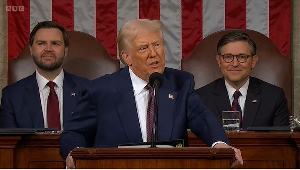President Nana Addo Dankwa Akufo-Addo has thrown a major challenge to the Ghana Real Estate Developers Association (GREDA) to provide at least 20,000 housing units per annum to help reduce the growing housing deficit.
In a meeting between GREDA and the president at Flagstaff House, where the association asked the president for incentives to aid their businesses build 5,000 affordable housing units, the president noted that with a current deficit of 2 million housing units, nothing short of 20,000 units per annum will be acceptable.
“You want to build 5,000 units when the current deficit is around 2 million units? That will take forever. The least I expect is 20,000 units per annum. Come back with a proposal on that and we can easily discuss incentives to help you achieve such a target,” the president said.
President of GREDA, Patrick Ebo Bonful, stressed that GREDA stands ready to partner government in confronting the worsening housing deficit, adding that the association has in the past partnered SSNIT to build GREDA Estates at Teshie Nungua.
“GREDA is aware that government cannot do it alone, and so is proposing to roll out affordable housing schemes across the country. To do this, GREDA requires tax breaks on building materials; 5 percent tax on profits; land provided by government; and electricity and water supply extension to precincts of the project.
“Additionally, GREDA proposes tax breaks for any GREDA-member who will produce affordable houses at the proposed prices anywhere across the country,” he stated.
President Akufo-Addo said his government will not hesitate to grant tax waivers for companies interested in delivering truly affordable housing to the people. He mentioned import duties as one area that government would be willing to review in favour of developers in the event they show that they are providing affordable housing.
Mr. Bonful expressed gratitude to President Akufo-Addo for the proposed establishment of a National Mortgage and Housing Finance Scheme (NMHFS), as announced in the 2018 Budget Statement and Economic Policy of government.
He said that announcement led to inauguration of the National Housing Committee last month by the Ministry of Works and Housing, with GREDA as a member.
The meeting touched on several topics and also allowed GREDA to brief the president on current events in the sector, as well as make requests for other policy initiatives to help smoothen the relationship between developers and government in the fight for decent and affordable houses for the populace.
The discussion focused on allodial land registration, the land guards menace, the need for land banks to help reduce land litigation issues, and how the government can help private developers construct affordable houses for the populace.
With Ghana’s courts awash with various land litigation cases, some of which are as old as 15 years or more, Mr. Bonful noted that such litigations have a telling effect on residential housing delivery by real estate developers – and this has given rise to the menace of land guards in the country. A situation, he added, which threatens law and order in Ghana’s young democracy.
According to a Bank of Ghana November 2007 survey on the State of the Housing Market in Ghana, about 31 percent of real estate developers are embroiled in one land litigation case or another. Also, about 50 percent face challenges of access to litigation-free land.
He therefore lauded the president for presentation of a draft bill on vigilantism to deal with the menace of as well. Even before passage of the law, GREDA appealed for the president to crack the whip and deal with the land guards menace with the same force and determination with which the issue of galamsey was tackled in this country, and to ban all activities of land guards in all its forms immediately.
But President Akufo-Addo urged GREDA, as an institution, to constructively contribute to the bill so that the outcome will benefit everyone. “The law should be ready by the middle of June. That period should allow for discussions so implementation will be good.”
Business News of Friday, 17 May 2019
Source: thebftonline.com

















